|
Olá! I’m Miguel, a PhD candidate at the Laboratory for Product Development and Lightweight Design, TUM School of Engineering and Design at the Technical University of Munich. My research focuses on hackathons for developing innovative mechatronic products, and I've led projects like MCube STEAM and THINK. MAKE. START. with BMW Group. During my PhD, I led the THINK. MAKE. START. programme (2019-2024), fostering innovation by guiding students in solving real-world problems with new technologies. As a Freelancer at Mintech Engineering since 2022, I lead design thinking and prototyping workshops, collaborating with industry partners like BMW Group, Siemens Digital Industries, and UnternehmerTUM Makerspace. My focus is on ideation, user need identification/specification, prototyping, and storytelling. I hold an M.Sc. in Mechanical Engineering and Management from TU Munich and a B.Sc. in Mechanical Engineering and Economics from TU Graz. Outside of work, I’m an advanced hobby barista who loves a good espresso, a vinyl enthusiast spinning classics and new hits, a passionate analog photographer, and a passionate hobby cook exploring different cuisines. I also enjoy road/gravel biking (e.g., Munich to Bolzano) and hiking (e.g., Alps, Norway, Portugal). |
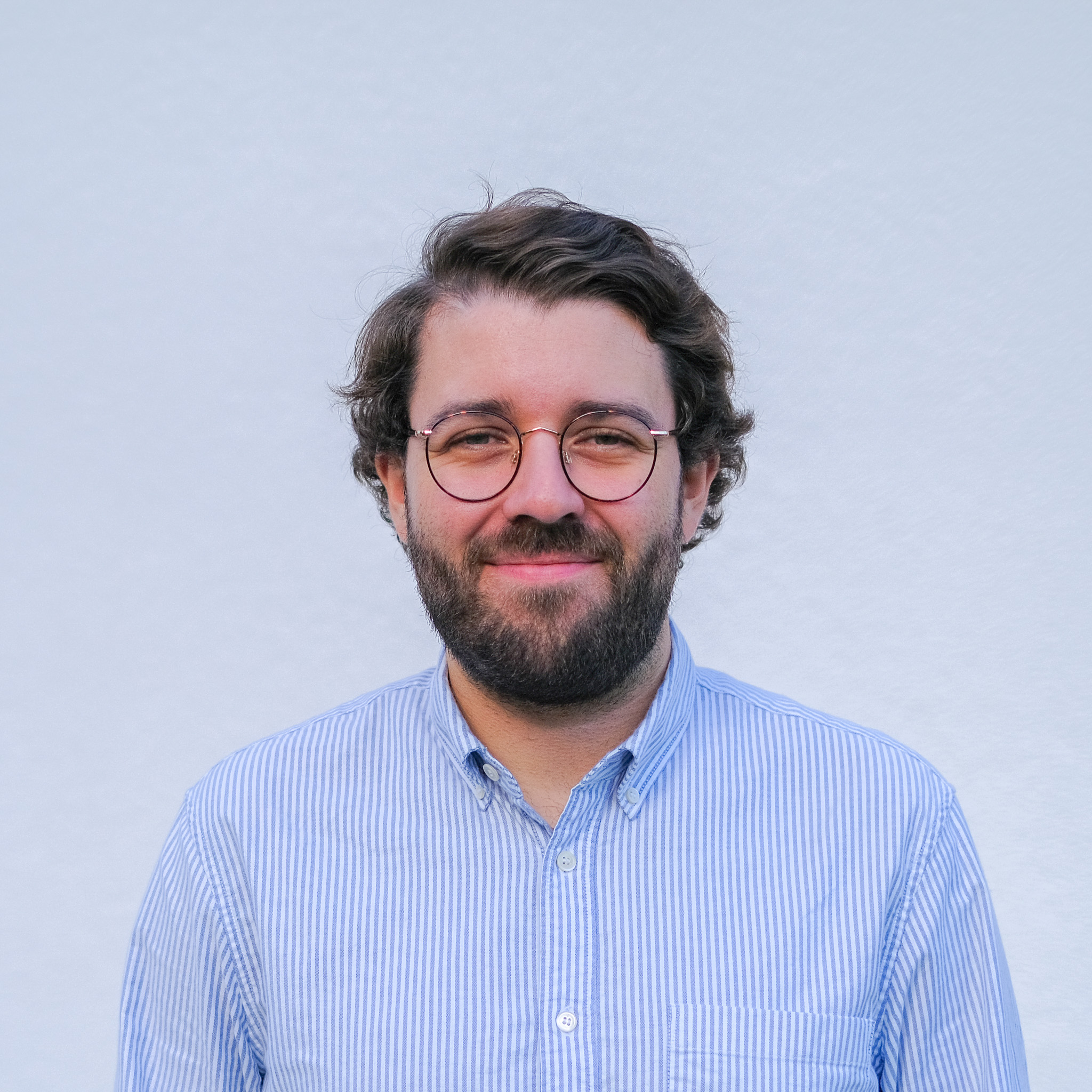
Email / LinkedIn / GitHub / Google Scholar / ResearchGate Download my current CV. |
Research ProjectsI am interested in hackathons, urban mobility, concept development, design methodologies, and prototyping. My research primarily focuses on investigating the influence of hackathons on product quality and the educational benefits for participants. I also develop novel urban mobility concepts for future scenarios. |
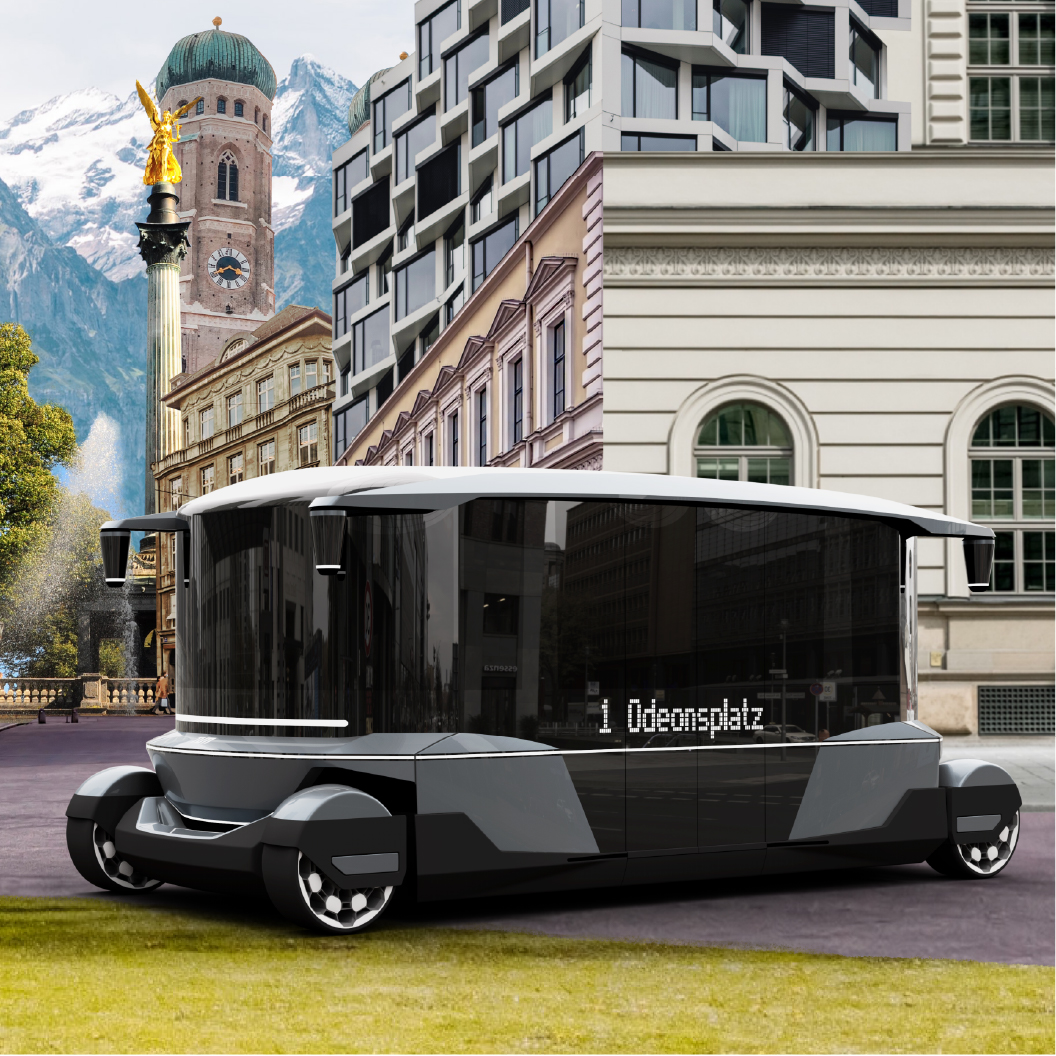
|
MCube STEAM - Development of an integrated bus system to combine passenger and parcel transportNuno Miguel Martins Pacheco, Moritz Seidenfus, Martin Frank, Fabian Fehn, Roman Engelhardt, Benedikt Lienkamp, Markus Mörtl, Michael Roth, Johanna Golas, Jan Rössnig, Thorsten Bergmeier-Trede, Maximilian Wegner Federally funded three-year research project, 2024 website / website 2 / youtube / MCube STEAM is a research project funded by the Federal Ministry of Education and Research (BMBF), conducted in collaboration with four TUM chairs (Product Development and Lightweight Design, Automotive Technology, Traffic Engineering and Control, and Business Analytics & Intelligent Systems), MAN Truck & Bus SE, BMW Group, Stadtwerke München GmbH, and Stanglmeier Touristik. The goal was to develop a novel integrated bus system concept that combines parcel and passenger transport to enhance road-based public transportation in Munich. The concept was realized and presented at IAA Mobility 2023 as part of a VR experience. It included a virtual bus commute from Münchner Freiheit to Odeonsplatz, showcasing all the innovations introduced with the concept. |
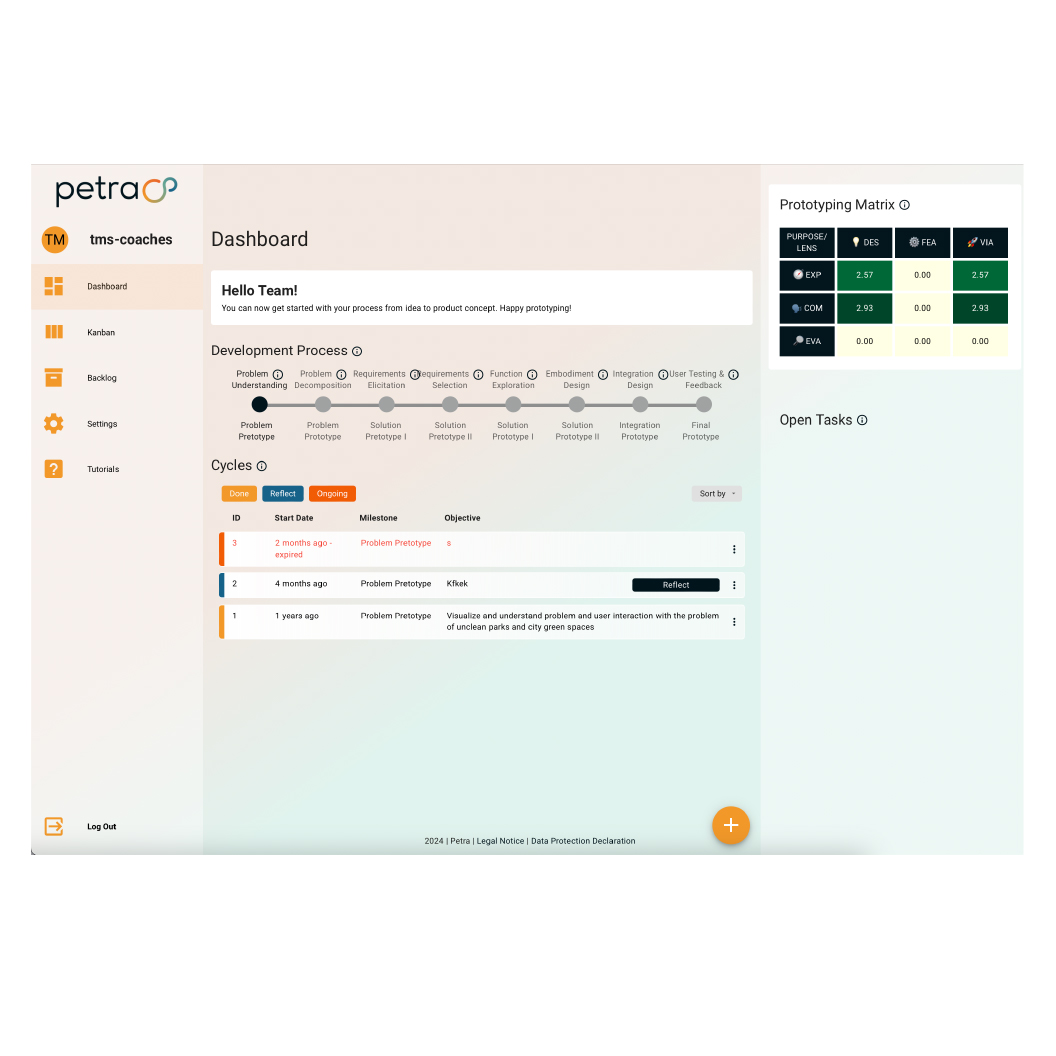
|
PETRA SPA (Single Page Application) - Design support for innovative mechatronic product developmentNuno Miguel Martins Pacheco, Anand Vazhapilli Sureshbabu, Markus Zimmermann, Laura Isabel Durán Noy, Masaru Charles Nürnberger, Andreas Feldl Research tool for data collection, 2024 code / website / This web application is a design support for innovative mechatronic product development which helps novice teams to manage and simplify their prototyping journey from idea to product concept by using project cycles and following an adapted double diamond approach. |
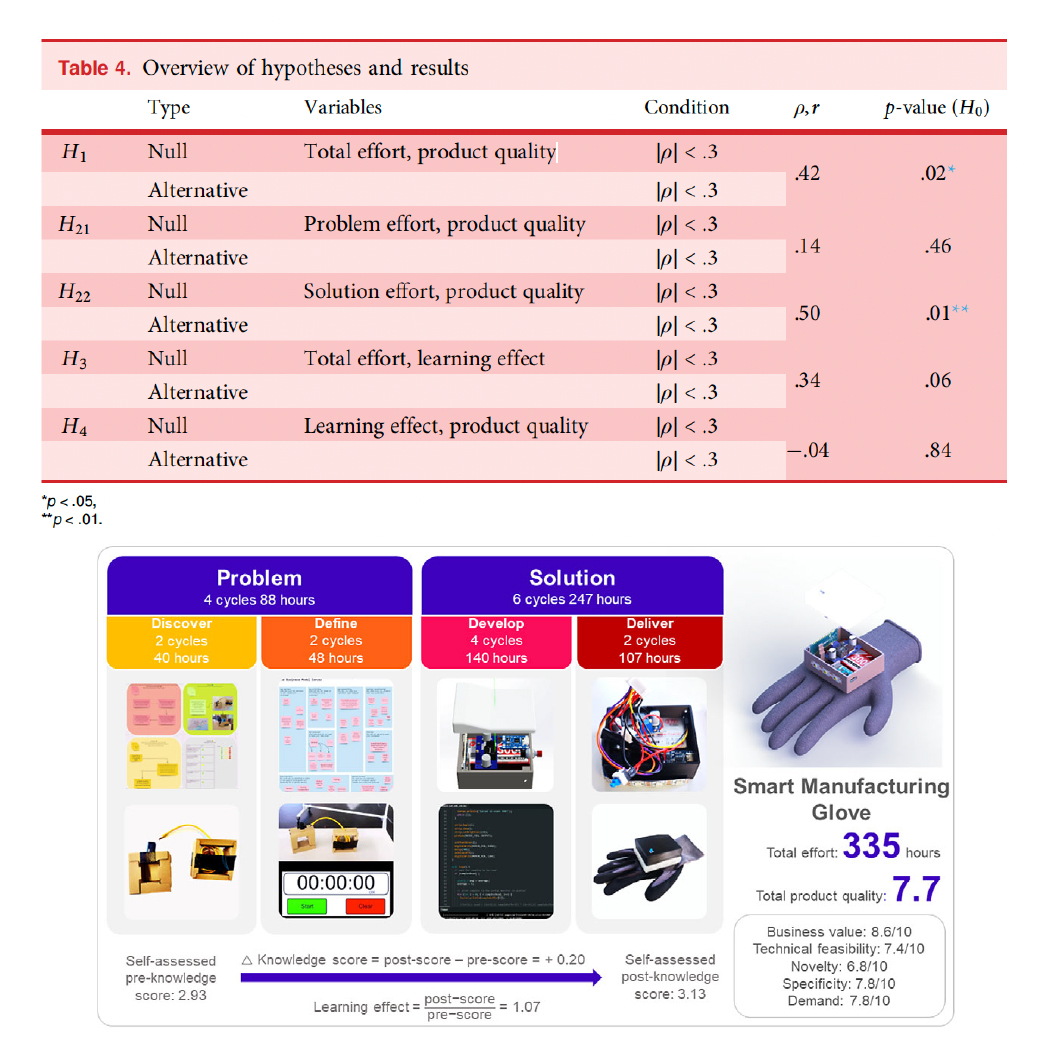
|
Learning by doing? The relationship between effort, learning effect and product quality during hackathons of novice teamsNuno Miguel Martins Pacheco, Mara Geisler, Medina Bajramovic,Gabrielle Fu, Anand Vazhapilli Sureshbabu, Markus Mörtl and Markus Zimmermann Design Science Journal, 2024 doi / This article explores how novice teams participating in hackathons learn and improve product quality through effort. The main result shows that increased effort, especially during the solution phase, significantly improves product quality. Other types of effort and their correlation with product quality are insignificant. This underscores the importance of the solution phase for the resulting product quality, while the impact on learning effect needs further research. |
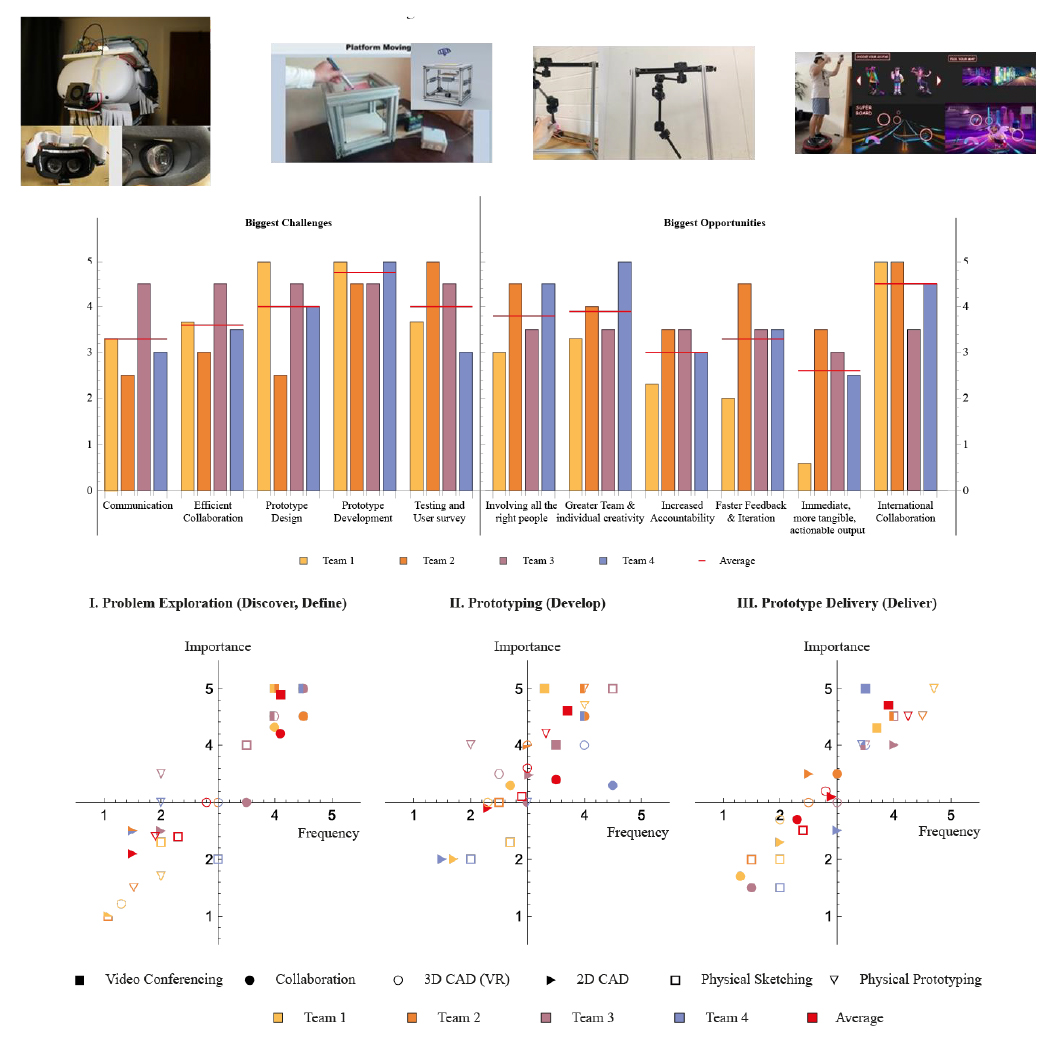
|
Challenges and Opportunities in Remote Prototyping: A Case-Study during COVID-19Nuno Miguel Martins Pacheco, Anand Vazhapilli Sureshbabu, Elena Dieckmann, Maria Apud Bell, Stephen Green, Peter Childs and Markus Zimmermann Proceedings of the International Design Conference, 2022 doi / The article together with the Imperial College London (ICL) examines the impact of remote work on prototyping activities during the COVID-19 pandemic. The study used a double diamond approach to guide four student teams through the design process remotely, utilizing various tools such as VR and collaborative platforms. The main result highlights that while remote tools facilitated communication and initial design stages, significant challenges arose in physical prototyping due to limited access to tools and infrastructure. The study underscores the need for improved integration of digital tools to enhance remote collaboration and prototyping effectiveness. |
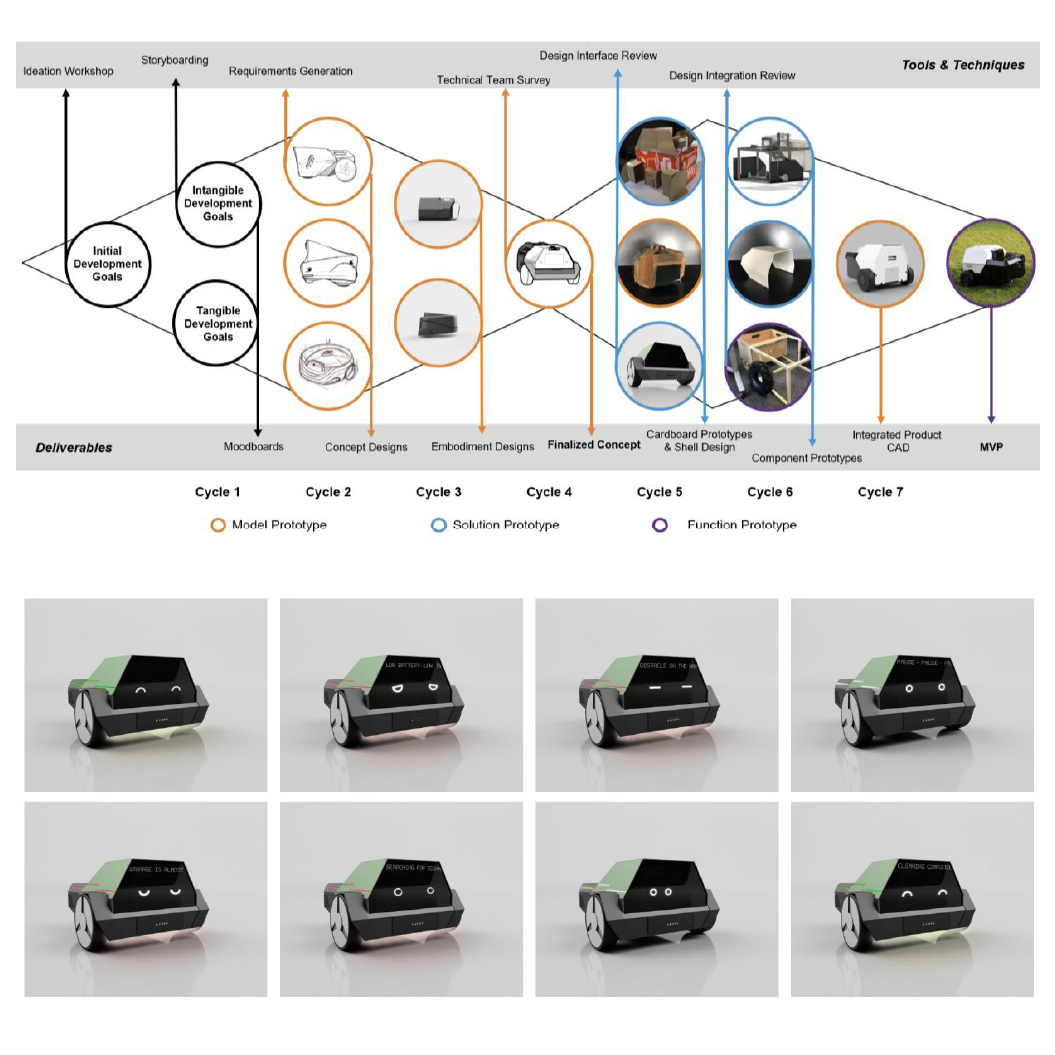
|
Design of an Autonomous Trash-Picking Service Robot Focussed on Human-Robot InteractionAnand Vazhapilli Sureshbabu, Nuno Miguel Martins Pacheco, Laura Isabel Durán Noy and Markus Zimmermann Proceedings of the International Design Conference, 2022 doi / This article explores the development of a trash-picking robot together with a robotics startup with a strong emphasis on human-robot interaction (HRI). The study utilizes the double diamond process to enhance the robot’s usability and user experience. |
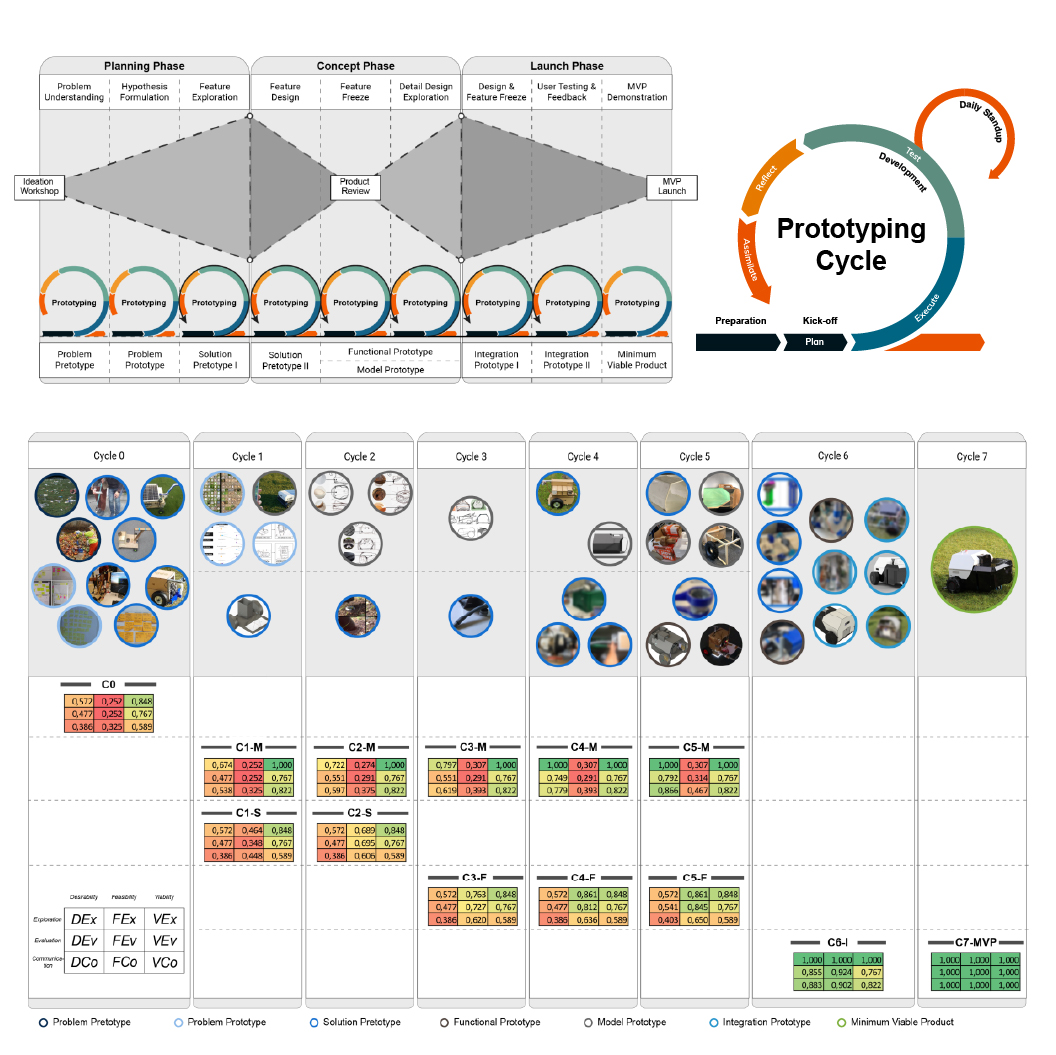
|
A Fuzzy Front-End Product Development Framework for StartupsNuno Miguel Martins Pacheco, Anand Vazhapilli Sureshbabu, Masaru Charles Nürnberger, Laura Isabel Durán Noy and Markus Zimmermann Proceedings of the International Conference on Engineering Design, 2021 doi / The article presents the PETRA framework to guide start-ups through the fuzzy front-end of product development. Applied in a case study with robotics startup, PETRA improves resource allocation, team organization, and the development process, leading to a clear roadmap for achieving a minimum viable product (MVP). Key elements include role-based prototyping and iterative cycles with a Protoban for planning. The framework enhances efficiency and effectiveness in early-stage product development and is adaptable to various start-ups and products. |
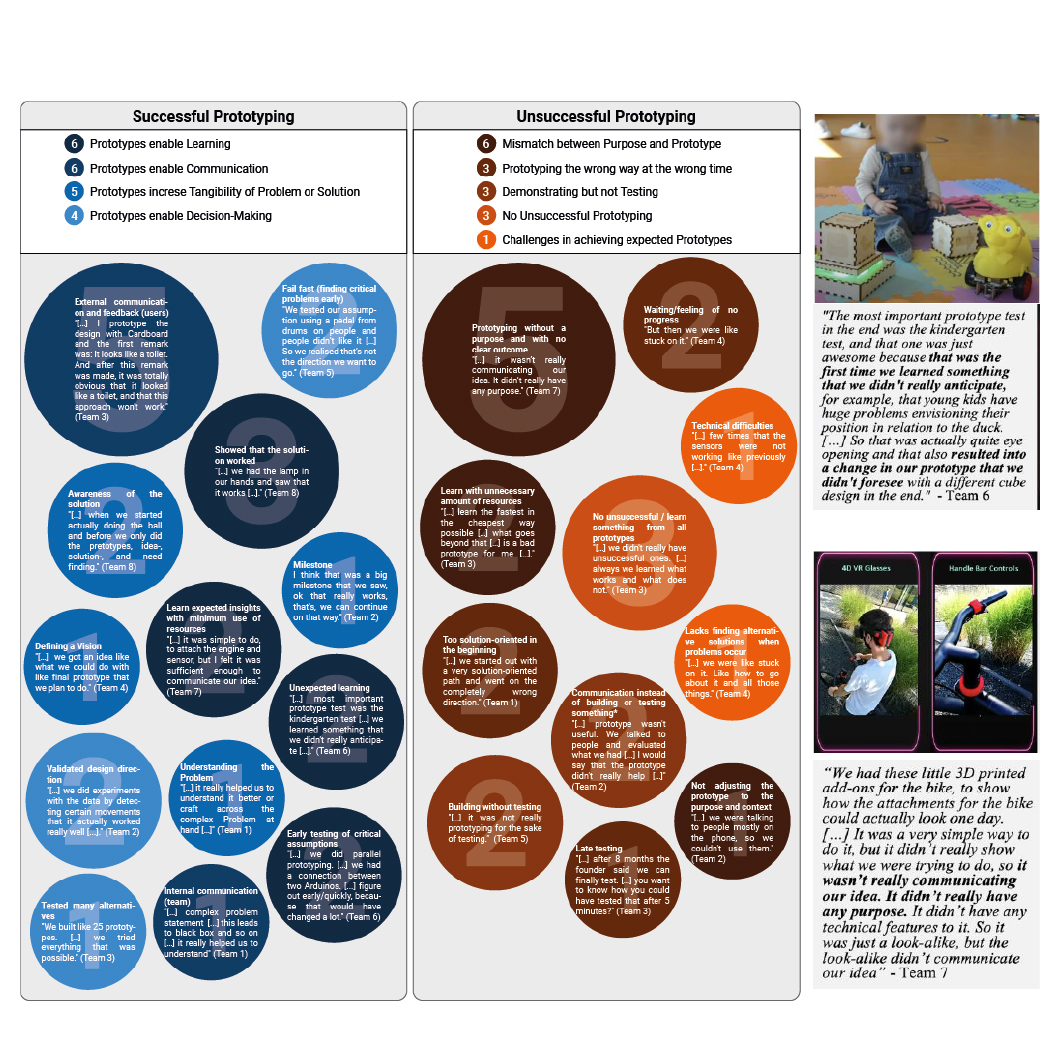
|
What is successful prototyping? Insights from Novice Designers' Self-Evaluation of Prototyping SuccessCamilla Arndt Hansen, Nuno Miguel Martins Pacheco, Ali Gürcan Özkil and Markus Zimmermann Proceedings of the International Conference on Engineering Design, 2021 doi / The article together with the Technical University of Denmark (DTU) examines how novice design teams perceive the success of their prototyping activities during a 10-day makeathon. The study finds that prototypes aimed at feasibility and solution validation are seen as more successful compared to those focused on desirability and problem validation. Key indicators of successful prototypes include their ability to aid in communication, decision-making, learning, and enhancing tangibility. The research highlights the importance of clear outcomes from prototypes to progress projects and suggests that guidance should focus on helping teams identify and use early-stage prototyping outcomes effectively. |
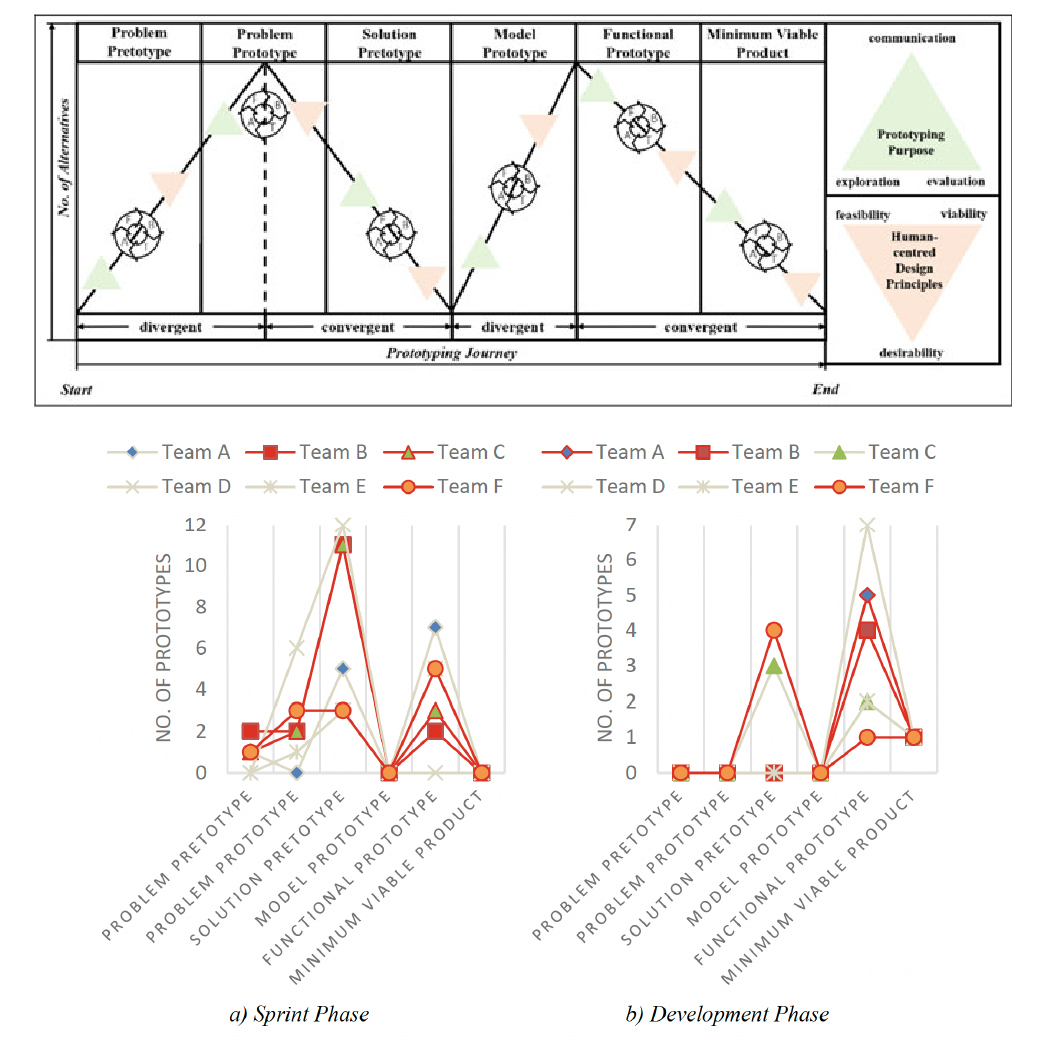
|
A Role-Based Prototyping Approach for Human-Centered Design in IndustryNuno Miguel Martins Pacheco, Anand Vazhapilli Sureshbabu and Markus Zimmermann Proceedings of the International Conference on Research in Design, 2021 doi / The article adapts the RBPA for industrial contexts, focusing on structured roles and prototyping phases (problem, solution, launch). Applied in a university-industry course, it improved team organization and product development. Key findings highlight the importance of early problem understanding and structured prototyping for successful product outcomes. Further research is needed to evaluate its broader applicability. |
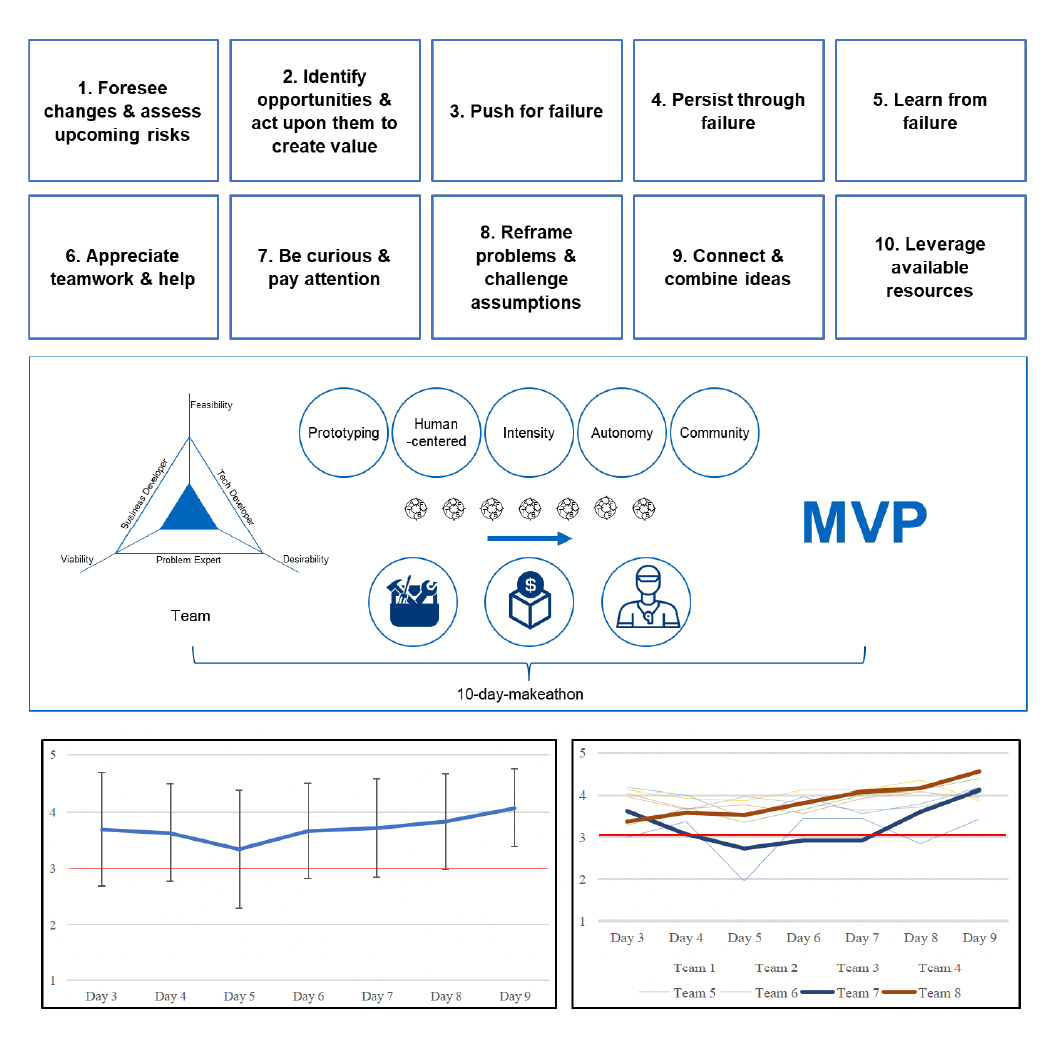
|
A Behavior-Centric Concept for Engineering Education in New Product DevelopmentJan Behrenbeck, Nuno Miguel Martins Pacheco, Bilal Tariq and Markus Zimmermann Proceedings of NordDesign 2020, 2020 doi / The article introduces a ten-day makeathon course at the Technical University of Munich. The course, “Think.Make.Start.”, aims to develop engineering students’ behavioral competencies necessary for new product development and entrepreneurship. It emphasizes autonomy, teamwork, and iterative prototyping. The main findings show that the course effectively fosters desired behaviors like leveraging resources and learning from failure, though further research is needed on long-term impact and individual assessment. |
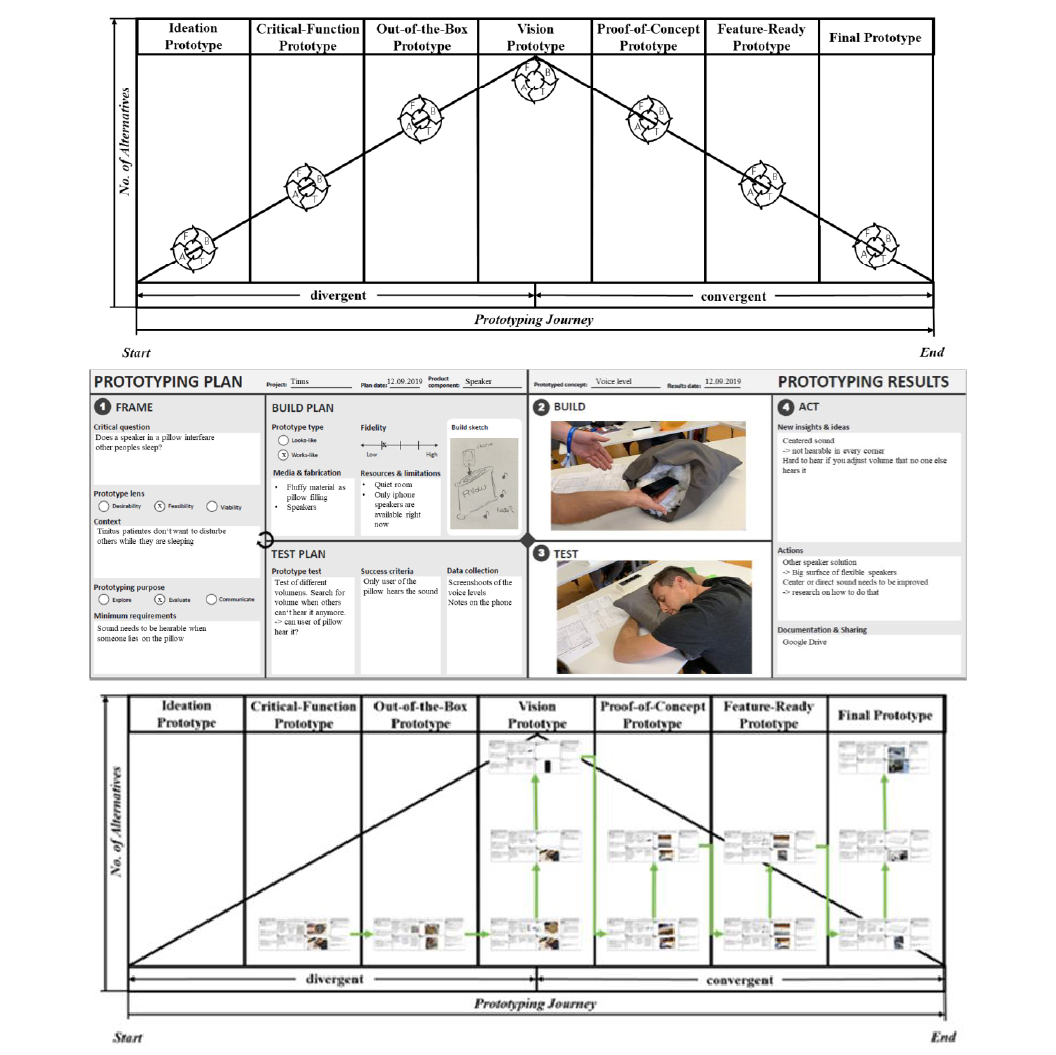
|
A Role-based Prototyping Approach for Human-Centred Design in Fuzzy Front-End ScenariosNuno Miguel Martins Pacheco, Jan Behrenbeck, Bilal Tariq, Anand Vazhapilli Sureshbabu and Markus Zimmermann Proceedings of NordDesign 2020, 2020 doi / The article introduces the Role-Based Prototyping Approach (RBPA) to aid novice designers in the early stages of new product development. This methodology focuses on structured prototyping activities and role allocation within teams to manage the uncertainties and complexities of the fuzzy front-end phase. The study shows that the RBPA enhances team collaboration and increases prototyping activities, ultimately improving the efficiency and effectiveness of developing minimum viable products (MVPs). |
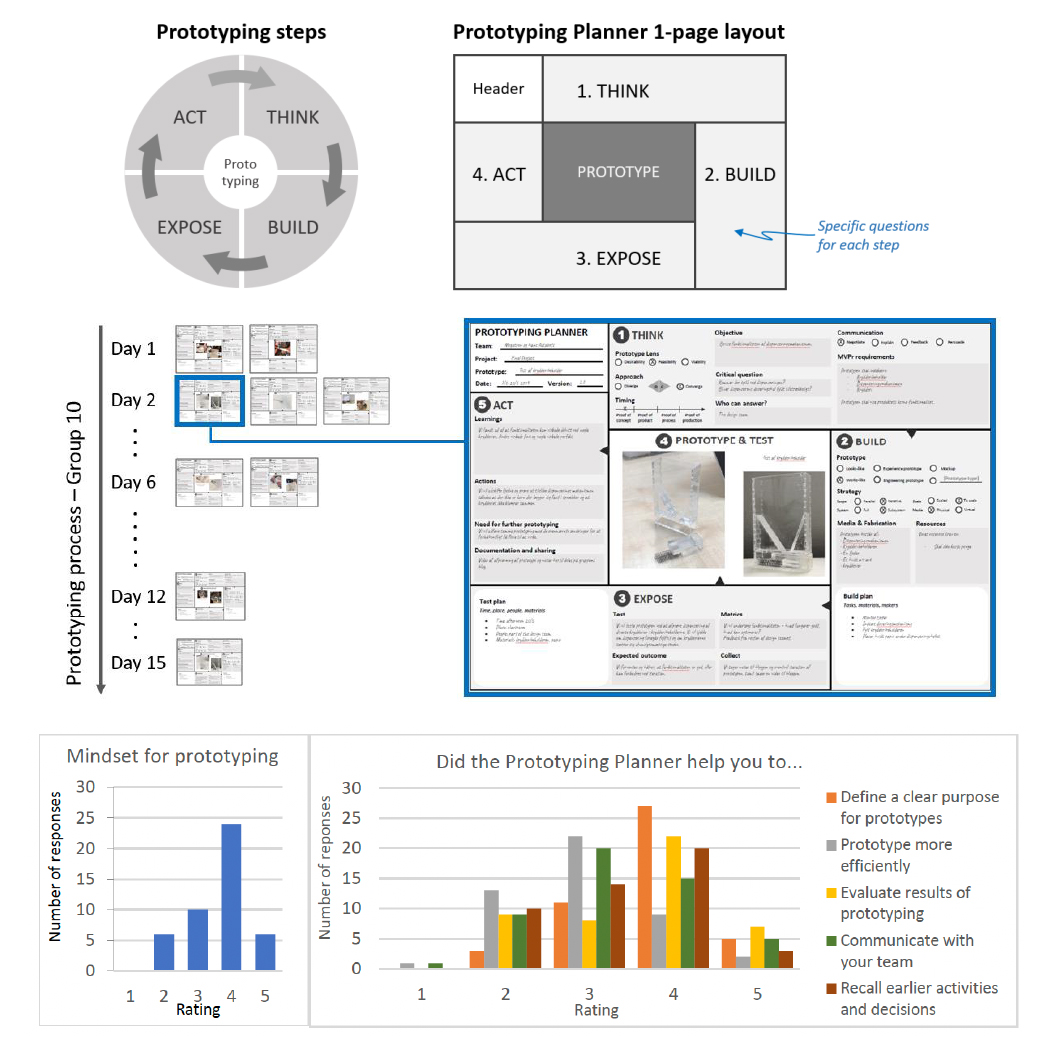
|
Fostering Prototyping Mindsets in Novice Designers with the Prototyping PlannerCamilla Arndt Hansen, Lasse Skovgaard Jensen, Ali Gürcan Özkil and Nuno Miguel Martins Pacheco Proceedings of the International Design Conference, 2020 doi / The article in collaboration with the Technical University of Denmark (DTU) introduces the “Prototyping Planner,” a tool designed to foster a structured prototyping mindset in novice designers. It outlines the development, testing, and evaluation of the tool over two years with 20 design teams. The main findings indicate that the Prototyping Planner helps novice designers create purposeful prototypes and evaluate results, though its efficiency in prototyping and ease of use received mixed feedback. Overall, the tool is seen as beneficial for teaching formal prototyping practices and enhancing documentation and communication of prototyping activities |
Industry ProjectsI managed development projects and lead design thinking and prototyping workshops to develop innovative mechatronic projects, primarily in the automotive sector. My work includes concept development and prototype implementation, showcasing product ideas and testing with preliminary users. Additionally, I identify novel use cases for emerging technologies to create practical and impactful solutions. |
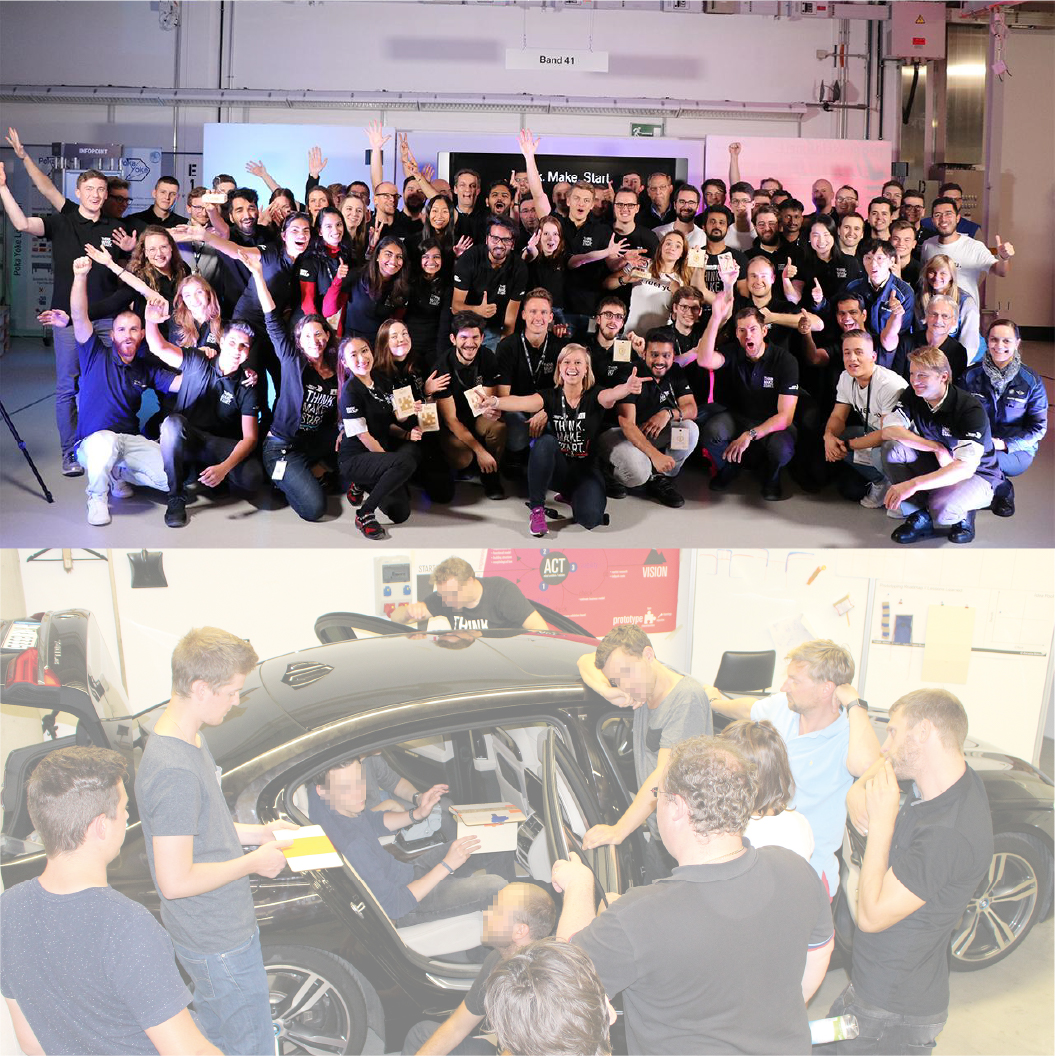
|
THINK.MAKE.START. by BMW Group - Internal design sprint to foster innovation through cross-functional collaborationAnnette Böhmer, Nuno Miguel Martins Pacheco, Maximilian Bandle Internal design sprints, 2023 website / youtube / TMS is a one-week design sprint, hosted by BMW Group. I organized and coached cross-functional teams by supporting teams to develop with a problem-focused approach novel solutions (e.g., user experiences, potentials of new technologies, or current challenges). This helps to address novel topics as part of the organisation to stay competitive (e.g., Metaverse). |
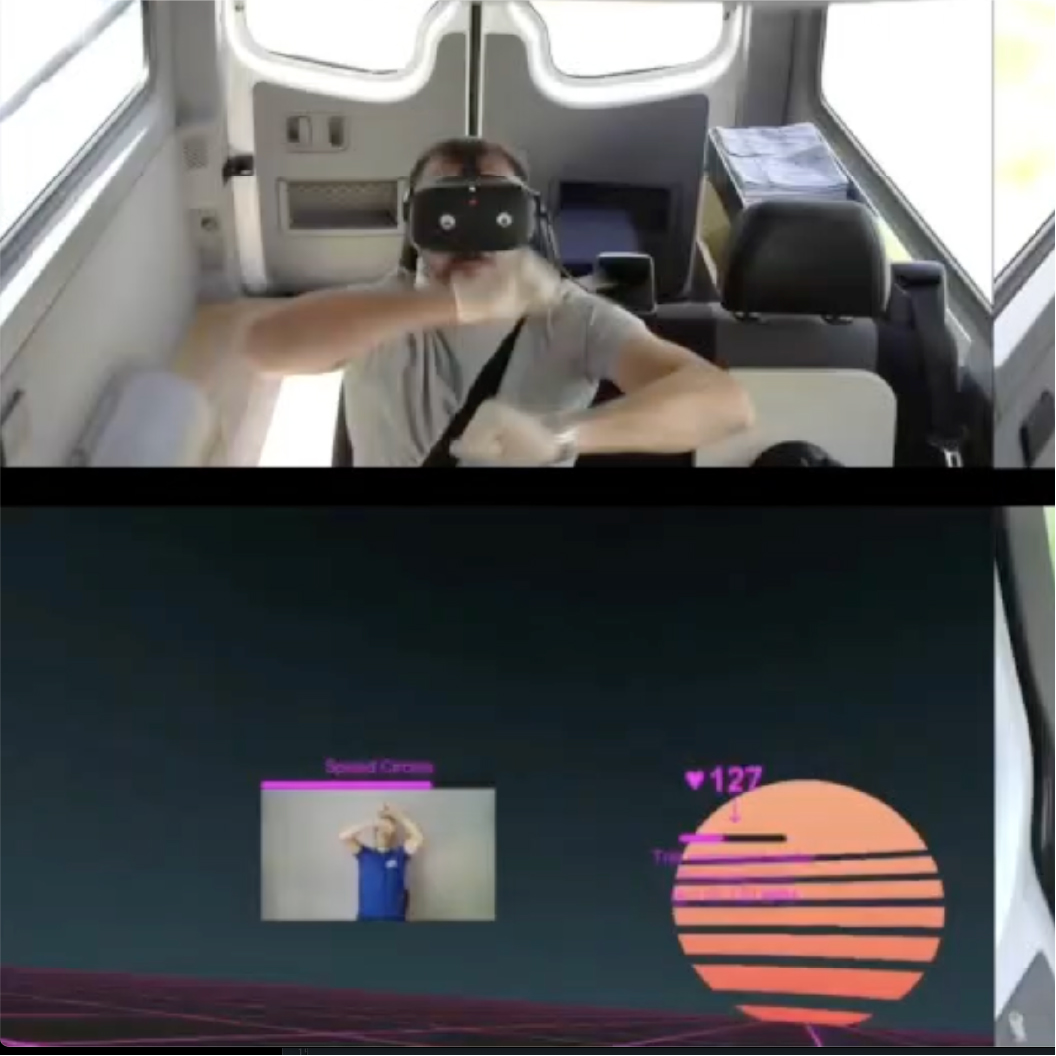
|
Moving space - Development of a VR sports concept for commutersNuno Miguel Martins Pacheco, Annette Böhmer, Michael Schraut, Maximilian Berger, Julian Gesell, Christopher Heiduk, Christian Röttger, Moritz Neuberger Nine-month development project, 2020 youtube / Moving space is a industry development project together with BMW Group, UnternehmerTUM Makerspace, and Stanglmeier Touristik with the aim of developing a novel use-case for autonomous vehicles (AV). To enable physical excercises and reduce motion sickness, a sensor-box was integrated to sync real-time vehicle dynamics with VR activities, enhancing user engagement. The solution was tested with multiple users providing valuable feedback. |
Teaching ProjectsI have led hackathon formats and mentored students in the development of new mechatronic products. I guided them through the entire process, from ideation to implementation, and actively collaborated on the projects to ensure successful outcomes. By fostering a collaborative and innovative environment, I helped students apply their knowledge and creativity to real-world challenges, resulting in practical and impactful solutions. |
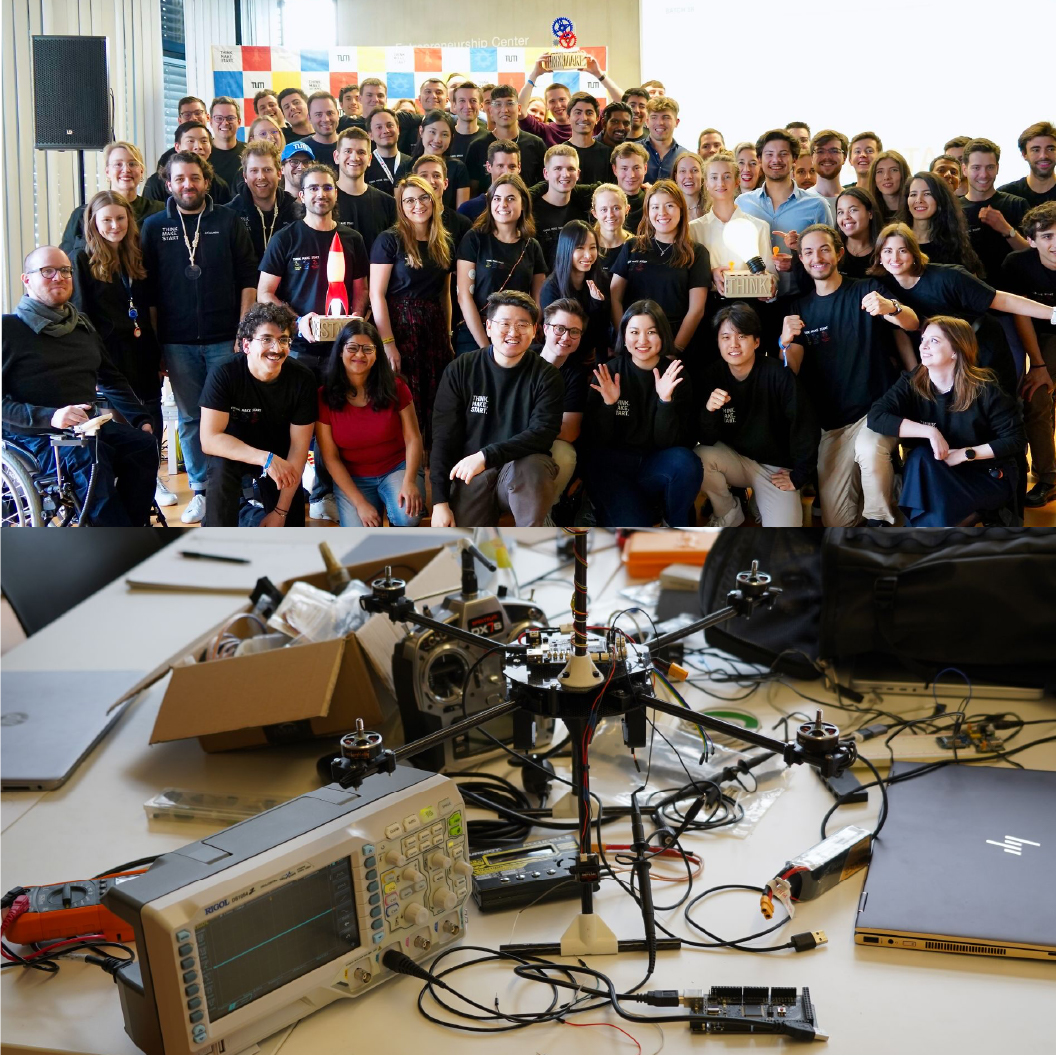
|
THINK.MAKE.START. by TUM and UnternehmerTUM - Build innovative products of your ideas in 2 weeksNuno Miguel Martins Pacheco, Maximilian Bandle, Carmen Baur, Tobias Förtsch, Belinda Büchner, Maximilian Reif, Yiyun Tong, Julia Hinderink Hackathon course, 2024 website / youtube / I led, managed, and coached the two-week course TMS designed to foster innovation and entrepreneurial thinking among students. Participants work in cross-functional teams to tackle real-world problems while collaborating to design, prototype, test and deliver a minimum viable product (MVP). The course has been instrumental in bridging academic knowledge and practical application, providing students with a platform to innovate and explore entrepreneurial ventures. There are several success stories that started a venture after the course with the original idea from the course (e.g., Angsa Robotics, Brainamics, Kewazo, Hawa Dawa, Beworm, Solos) |
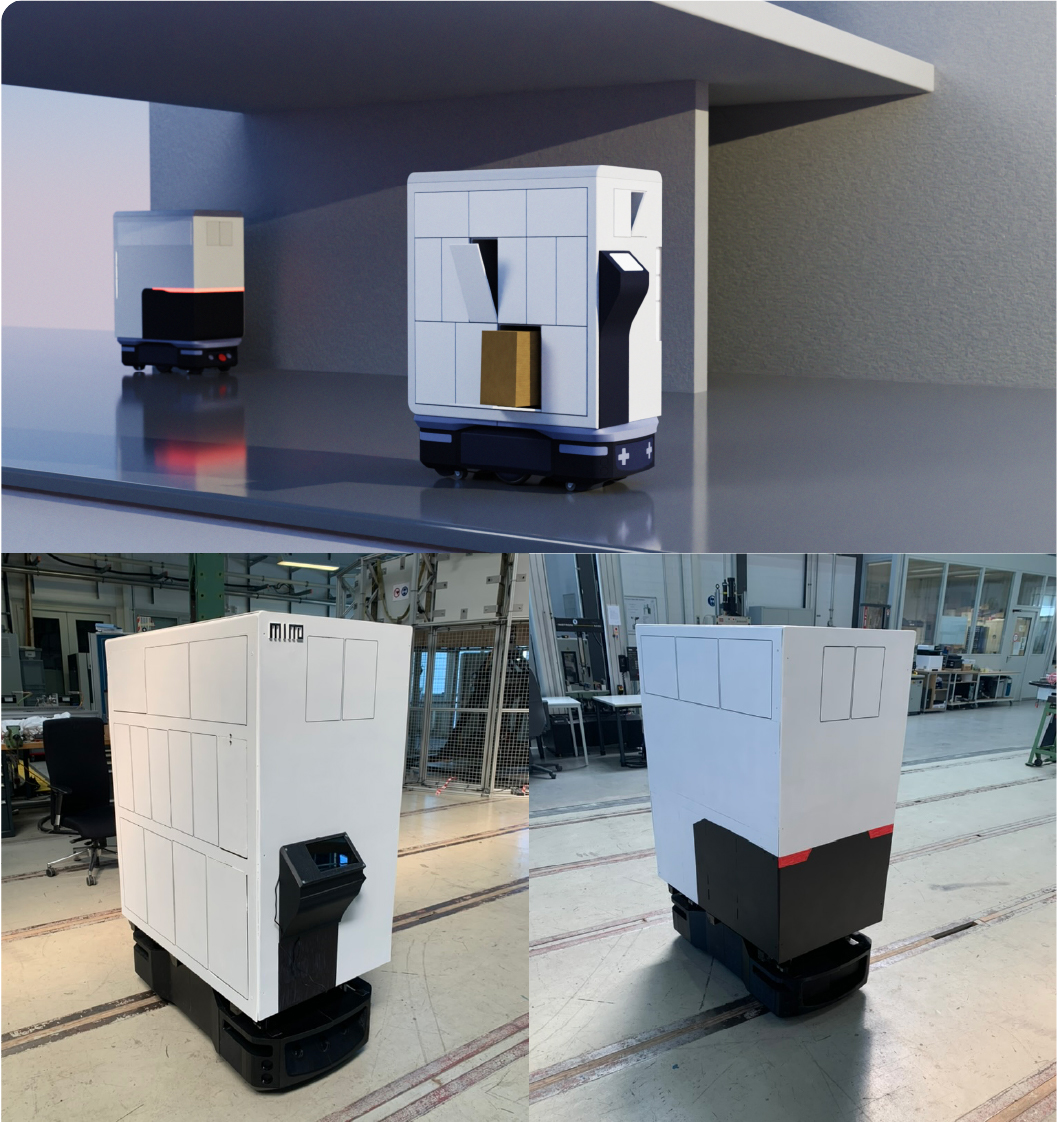
|
MiMo - An autonomous mobile parcel locker for road-based public transport systemsNuno Miguel Martins Pacheco, Moritz Seidenfus, Stephen Green, Elena Dieckmann, Nirmal Thomas, Linxi Cao, Hunaid Nagaria, Grace Duan International student development project, 2023 code / I managed and led a team from Imperial College London to develop MiMo, an autonomous mobile parcel locker robot. Designed to enter and exit public buses autonomously, MiMo aims to enhance urban parcel delivery by utilizing public transport infrastructure, thereby reducing congestion and improving logistics efficiency. As part of the project, we built a first prototype to demonstrate its dimensions and user interface. |
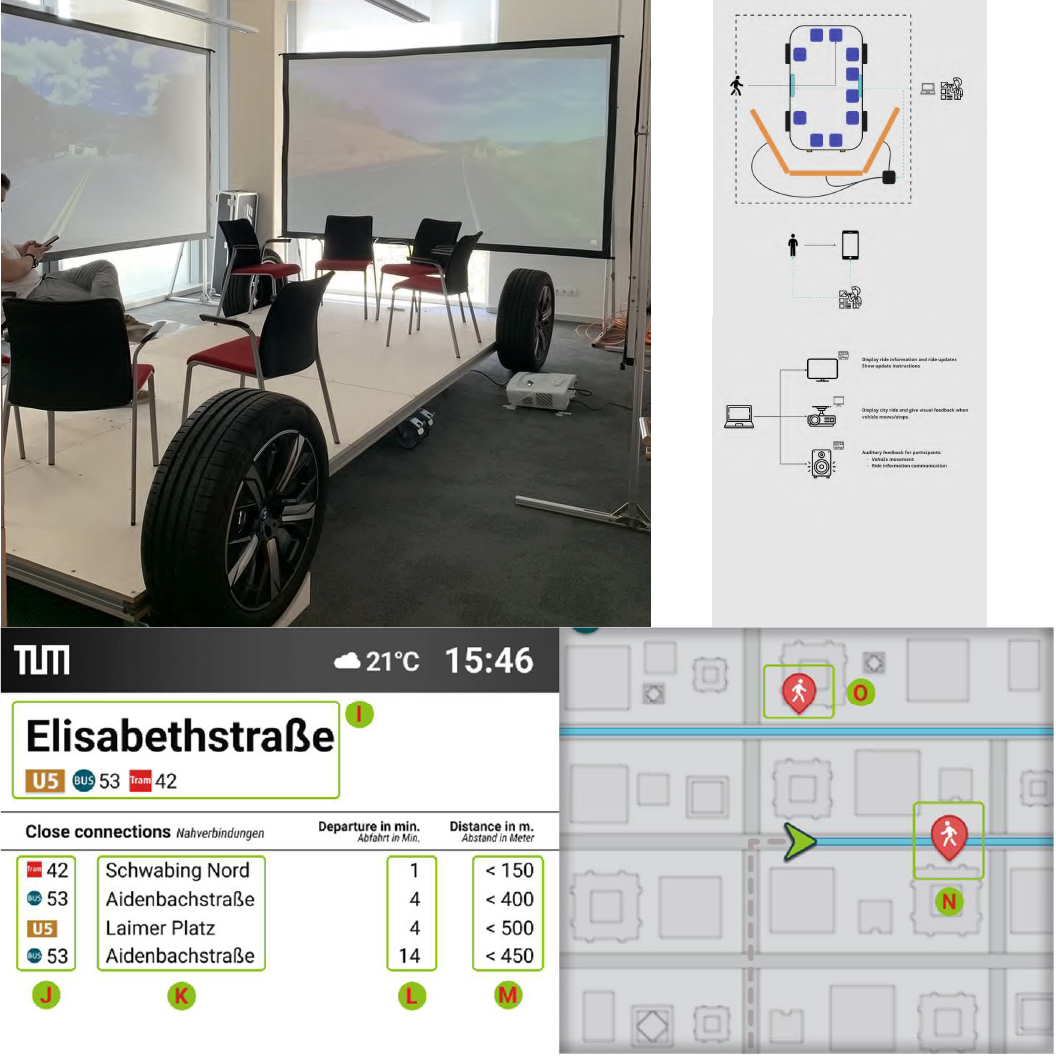
|
Mixed Reality Vehicle Prototype - Testing placing and content for infotainment systems in public transportStefano Ferrari, Nuno Miguel Martins Pacheco Student project, 2023 youtube / I mentored and worked closely with a student on a master thesis project focused on developing a mixed reality 1:1 vehicle prototype. This prototype, equipped with surrounding screens and sound, was designed to test the optimal positioning and content necessary for an infotainment system in road-based public transport. We tested and evaluated different versions of the infotainment system with various users to gather feedback on user preferences and interaction. This comprehensive evaluation provided valuable insights that guided our decisions on the most effective screen placement and content presentation for enhancing the user experience in public transport. |
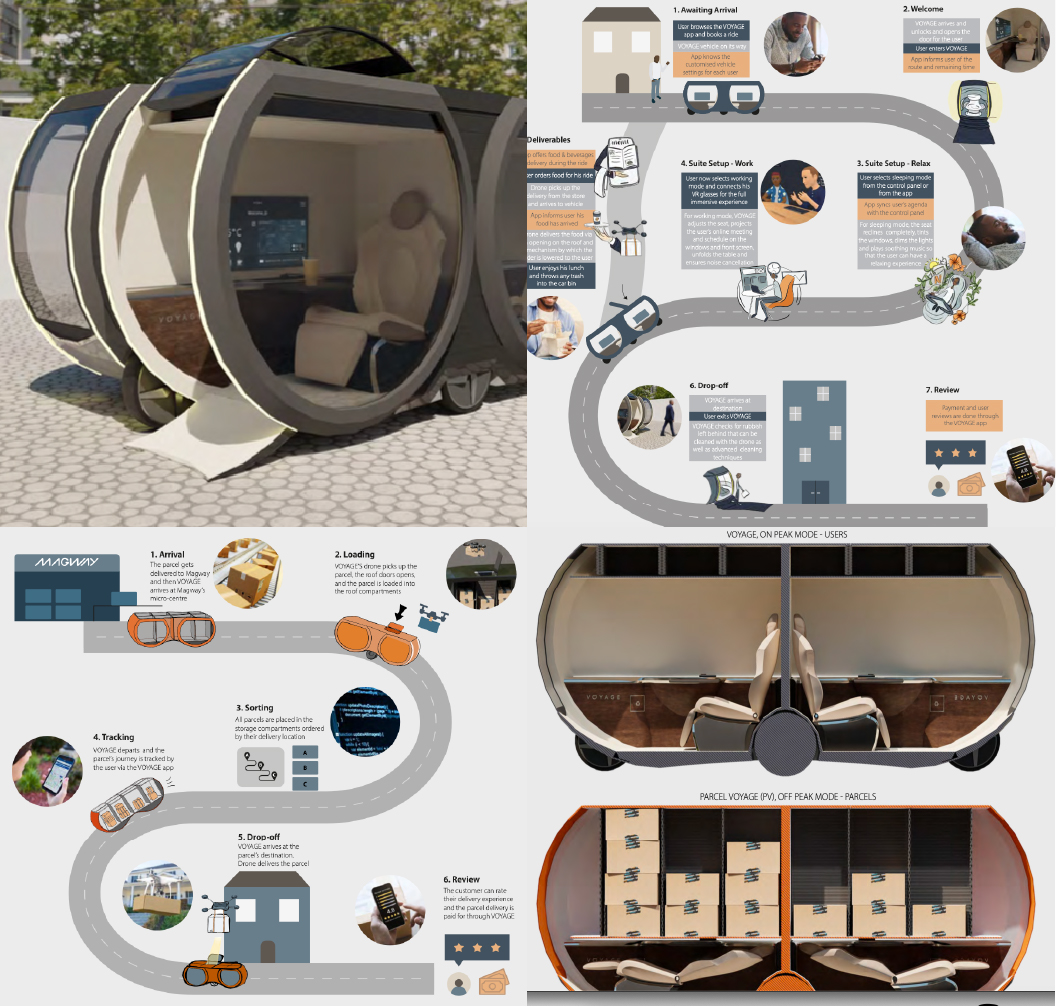
|
VOYAGE Vision 2041 - Utilization concept for a autonomous shared shuttle for passenger and parcel transportLeila Al-Azzawi, Itziar De Pedro, Robert Field, Esther Del Portillo, Harry Schlote, Carlos Caballero, Stefano Ferrari, Nuno Miguel Martins Pacheco, Moritz Seidenfus, Stephen Green, Elena Dieckmann International student development project, 2023 youtube / Led the collaboration project together with the Imperial College of London and coached the team in the development of an autonomous vehicle utilisation concept for urban mobility by combining passenger and goods transport in a Moving Space. The concept was presented AutoTech: Detroit 2022 event. |
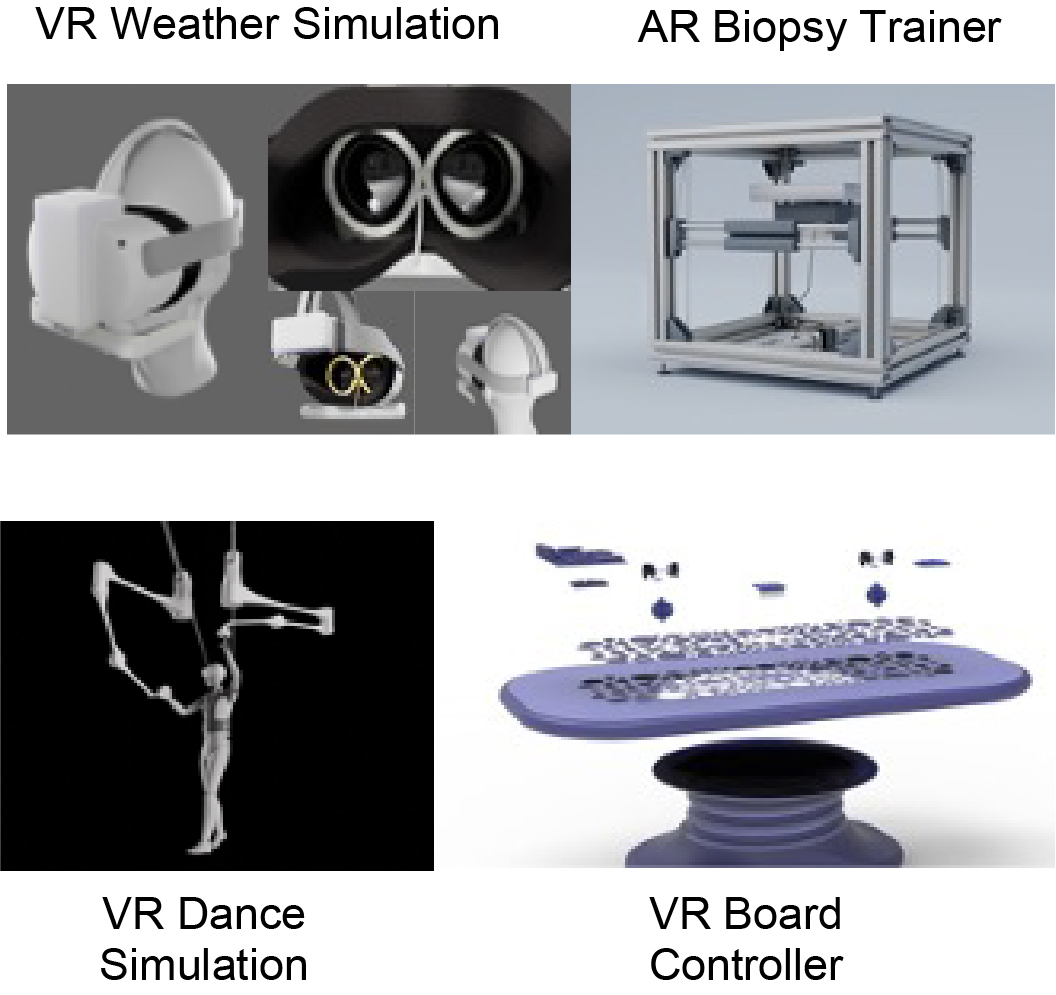
|
Tangibility - A remote collaboration project between TUM and Imperial to innovate VR interfacesNuno Miguel Martins Pacheco, Anand Vazhapilli Sureshbabu, Stephen Green, Elena Dieckmann, Maria Apud Bell, Peter Childs International student development projects (Remote), 2021 youtube / I managed and led the Tangibility project, a collaborative initiative between TUM and Imperial College London aimed at developing innovative Virtual Reality (VR) interfaces and enhancing remote multidisciplinary collaboration. I oversaw mixed teams of students from both institutions, coordinating activities, organizing project reviews, and providing expert guidance. Our efforts resulted in the successful development and prototyping of four unique VR applications: (1) a novel biopsy training tool in VR-AR for medical students, (2) a VR-controller interface for board sport games, (3) a VR-controller interface for remote ballroom dance practice, and (4) a multisensory, weather-simulating user experience for VR headsets. |
Private ProjectsI have applied my passion for solving problems and hands-on experimentation by working on a collection of private projects. These diverse projects reflect my commitment to continuous learning and creativity, showcasing unique solutions and technological explorations. Each project highlights my skills and dedication to developing practical and impactful solutions. |
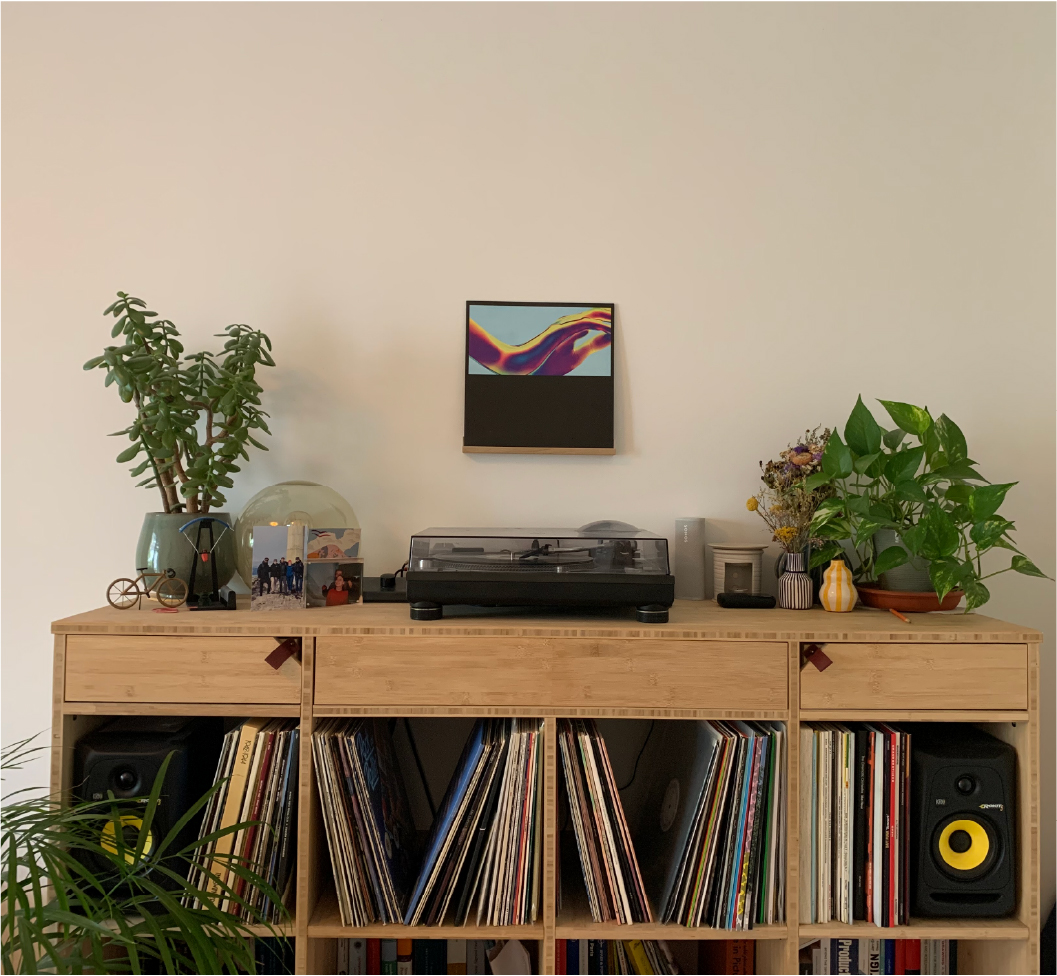
|
Custom Vinyl Shelf ProjectNuno Miguel Martins Pacheco Own project, 2022 I designed and built a custom vinyl shelf because I couldn’t find one that suited my needs. I selected bamboo wood for its durability and aesthetic appeal and then went to a wood workshop to construct the shelf. The result is a personalized and functional shelf that perfectly fits my vinyl collection. |
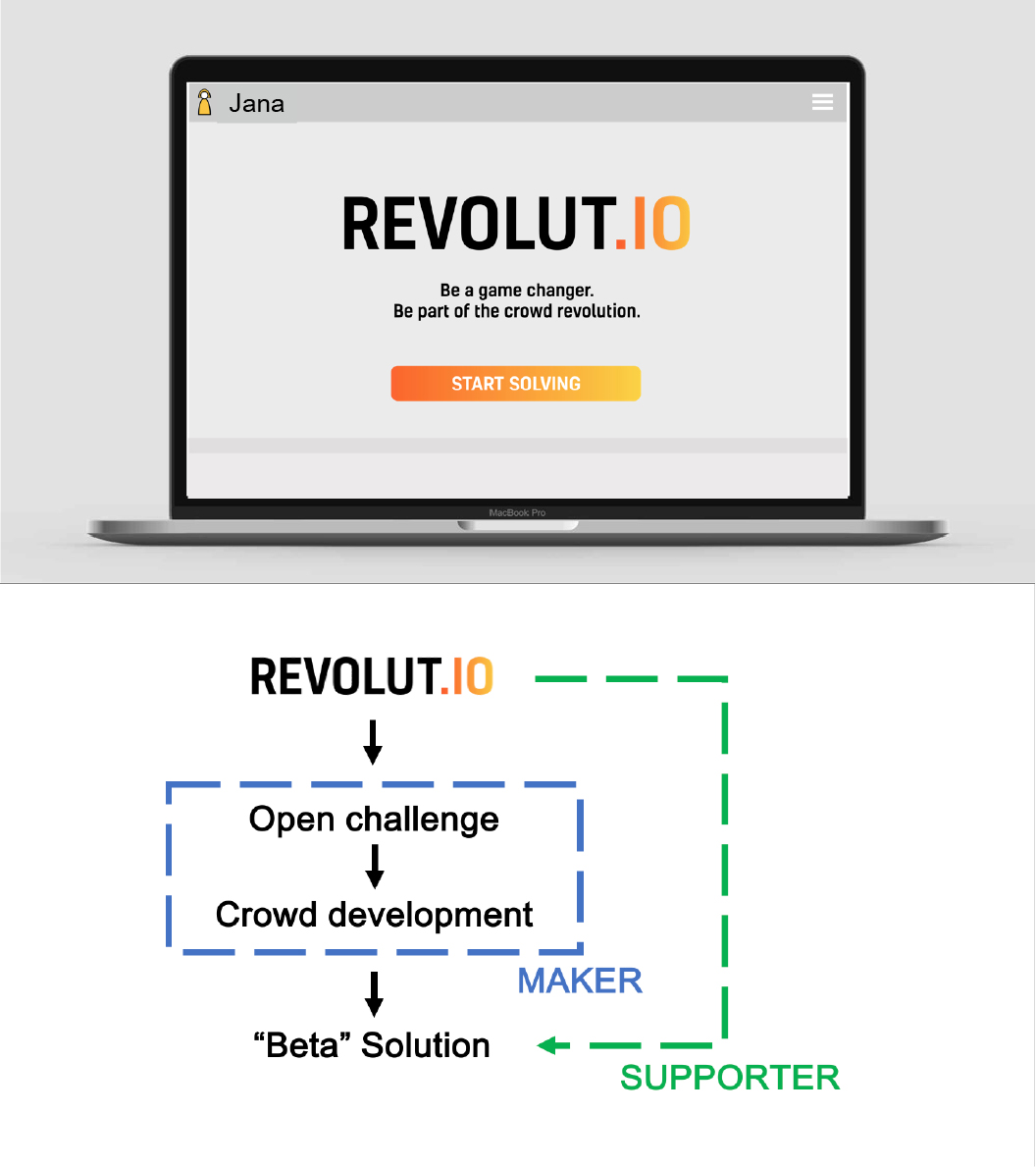
|
Vitra Hackathon - Revolut.io Crowd Innovation PlatformNuno Miguel Martins Pacheco, Stephan Dirring, Pablo Pabon, Christoph Schulte Vitra Hackathon, 2019 website / I participated as part of a cross-functional team in the Beta Hackathon at ZKM, where we were awarded first prize for the best concept. We developed a platform that combines crowd-based innovation with social responsibility, known as Social Product Development. My contributions included designing the UI/UX and developing the business model for the platform. The concept focuses on engaging the community to ideate and develop sustainable solutions for everyday problems, such as reducing the environmental impact of disposable coffee cups. Our platform encourages collaborative problem-solving and supports the creation of socially responsible products. |
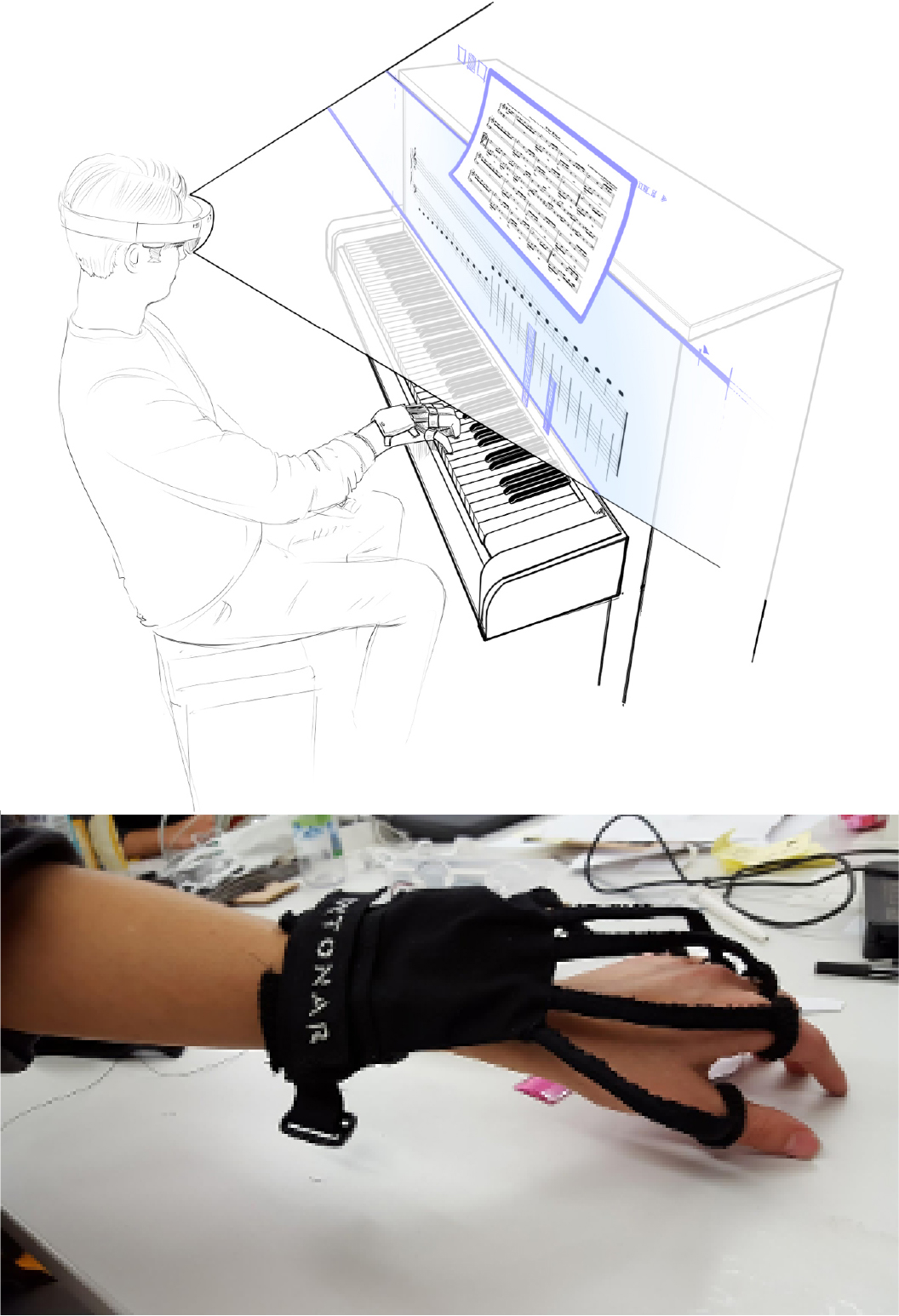
|
IntonAR - Augmented Reality Piano Trainer with Microsoft HoloLensNuno Miguel Martins Pacheco, Kristina Strobl, Lars Rasmussen, Luis Onuma, Philipp Strack Development project, 2017 youtube / I worked in a team to develop an innovative piano training tool using Microsoft HoloLens. The HoloLens displayed the content to play, while exoskeleton gloves provided vibrating indications for which fingers to use. This augmented reality piano trainer was tested with piano teachers and involved multiple user testing sessions to refine the user experience. Our goal was to create an engaging and intuitive learning tool for piano students by combining augmented reality with haptic feedback technology. My main part was developing and building the functional gloves for the users. |
|
Design and source code from Jon Barron's website modified by Leonid Keselman |